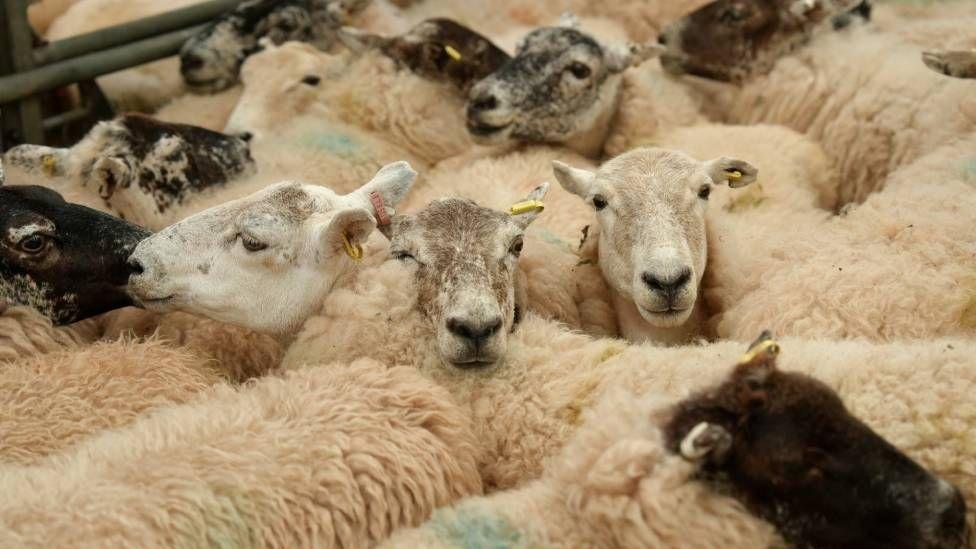Easing of Bluetongue Virus Restrictions in Wales
Bluetongue virus restrictions in Wales are set to be eased, allowing vaccinated livestock to be transported across the border to markets in England. This change marks a significant shift in policy and is expected to have a major impact on the farming community.
Starting from Monday, livestock that have completed a full course of bluetongue vaccination (BTV-3) will be permitted to travel to markets within 12 miles (20km) of the Welsh border. This decision comes after careful consideration of the risks associated with the virus and the needs of the agricultural sector.
Bluetongue is a virus transmitted by midge bites that affects cattle, sheep, and goats. It can be a potentially devastating disease for livestock, although it poses no threat to human health or food safety. The virus has been reported in some areas of England but not in Wales this year.
Wales’ chief vet, Richard Irvine, emphasized the importance of managing the spread of the virus while supporting the farming industry. He noted that the easing of restrictions aims to balance these two priorities.
Impact on Farmers and Markets
The previous restrictions, which have been in place since July, had a noticeable effect on the market. Farmer Ryan Thomas highlighted how the limitations forced Welsh farmers to buy stock locally, leading to increased prices. “Welsh farmers are all buying stock in Wales,” he said, noting that this situation has driven up costs significantly.
While movement of livestock from England into Wales remains restricted without a negative test, the new rules allow for dedicated sales of vaccinated Welsh-only livestock in English markets. These sales must adhere to strict conditions to ensure the virus does not spread.
Markets in England that are within the permitted travel range include Bishops Castle, Hereford, Kington, Ludlow, Market Drayton, Oswestry, Ross-on-Wye, and Shrewsbury. These locations will now serve as key points for cross-border trade.
New Rules for Livestock Movement
From Monday, any livestock returning to Wales from a market must come back on the same day they left. This means that animals will not undergo pre or post-movement testing if the conditions are met. This rule is intended to streamline the process while maintaining safety measures.
Phil Thomas, a vet in Aberystwyth, Ceredigion, welcomed the changes as a way to support livestock trading while managing the risk of the virus spreading. He pointed out that there are costs associated with both the disease itself and the trade restrictions. “This is one way of reducing those costs by taking the animals to recognized sales, albeit with extra precautions,” he said.
Thomas added that the move allows for trade in a “risk-evaluated way.” While there is a slightly increased risk of movement, the fact that the stock has been vaccinated and originated in Wales, and only spent a day at the market, makes the risk very small.
Vaccination Efforts and Industry Response
Despite the easing of restrictions, vaccination rates remain low. Only a very small percentage of livestock have been vaccinated against bluetongue. Helen Roberts of the National Sheep Association (NSA) in Wales noted that only 43,000 sheep have been vaccinated so far. She encouraged farmers to consider the vaccination status of their animals, especially as the autumn period approaches, which could be the worst time of the year for exposure to BTV depending on weather conditions.
Dr. Irvine explained that the phased changes were agreed upon following a review of bluetongue policy. The aim was to facilitate autumn sales while balancing industry needs with the risk of the disease entering Wales. Further changes, including making sales of breeding stock easier at “bluetongue-approved markets” in Wales, are being considered.
These markets could sell BTV-3 vaccinated livestock from both England and Wales, and applications for this status can be submitted from mid-September.
Challenges and Considerations
Despite the positive developments, vaccine scepticism remains a challenge. Some farmers are hesitant to vaccinate their livestock, which could affect the overall effectiveness of the new measures. This issue highlights the need for continued education and outreach to ensure widespread acceptance of the vaccination program.
As the farming community adapts to these changes, the focus remains on protecting livestock while supporting trade. The success of these measures will depend on cooperation between farmers, veterinarians, and government officials to ensure that the virus does not spread and that the industry continues to thrive.



